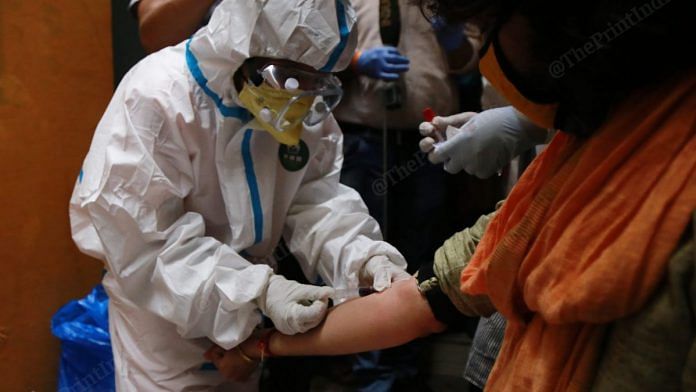New Delhi: The latest Delhi serological survey has thrown up a startling finding — the share of participants with Covid-19 antibodies was the highest in the cohort comprising 5-17-year-olds.
According to the survey results, 34.7 per cent of the participants aged 5-17 years had Covid-19 antibodies, while the figure stood at 31.2 per cent for those aged over 50 years, and 28.5 per cent for 18-49-year-olds.
The survey pegged Delhi’s overall Covid-19 exposure at 29.1 per cent. Minors aged 5-17 comprised 25 per cent of the overall survey pool of 15,000, the same as over-50-year-olds. Fifty per cent of the respondents were in the 18-49 age group.
With schools still closed in light of Covid-related restrictions, the high exposure among minors has left the authorities with few immediate answers about the possible reason.
The Delhi government is awaiting district-wise breakdown of data from the Maulana Azad Medical College (MAMC), which is compiling the survey results, to dig deeper into the findings, it is learnt.
Delhi Director General Health Services (DGHS) Nutan Mundeja told ThePrint that she will be able to comment only once they receive the details from the MAMC. “So far, only overall and preliminary results were declared and this is why we have decided to do sero surveys every month to be able to analyse such stuff,” she added.
A senior MAMC doctor said they “are still preparing the full report and are yet to find which district had maximum seroprevalence among minors”.
“While it is difficult to attribute specific reasons, it is likely to be in areas with unauthorised colonies, or areas with population from lower economic strata wherein social distancing is difficult,” the doctor added.
Also Read: 28.3% of Delhi’s population now exposed to Covid, shows second sero survey, up from 23.4%
‘Younger lot driving Covid-19 pandemic’
Delhi’s second serological survey was conducted in the first week of August among 15,000 people. Its results suggest 29.1 per cent of the capital’s population already has Covid-19 antibodies. If a certain degree of Delhi’s population is found to have developed Covid-19 antibodies, it may help the capital move past some of the remaining lockdown restrictions.
The results of the sero survey came the same week the World Health Organization said people in their 20s, 30s and 40s, most of them asymptomatic, are driving the Covid-19 pandemic.
The same trend has also been observed at the national level, with data from the Indian Council of Medical Research (ICMR) suggesting that people aged between 21 and 50 account for 61.31 per cent of the 27,32,992 Covid-19 cases recorded in India as of Friday.
Experts say the findings of the Delhi sero survey could be attributed to children contracting the infection from the adults in their family, among other reasons.
“Those under 18, even though schools are closed, are still susceptible to Covid-19, even though the manifestation is usually mild,” said Anant Bhan, a researcher in global health and bioethics. “It is likely that the adherence to public health precautions (mask use, hand hygiene, physical distancing) might have been lesser in kids compared to others,” Bhan added.
He said children might be exposed to infection risk at home, or when they go out to play.
Dr S.K. Sarin, gastroenterologist and head of the Delhi Covid taskforce, offered a similar explanation.
“There are multiple doctors, health workers and other frontline workers who have been stepping out amid the pandemic. Even though children continue to stay at home, in many cases, parents return home, except for those cases where the respective governments might have made arrangements for their quarantine… so perhaps these asymptomatic cases are spreading among the younger population too,” he said.
This report has been updated with additional information
Also Read: Delhi’s second sero survey finds more women exposed to Covid than men, no herd immunity yet



